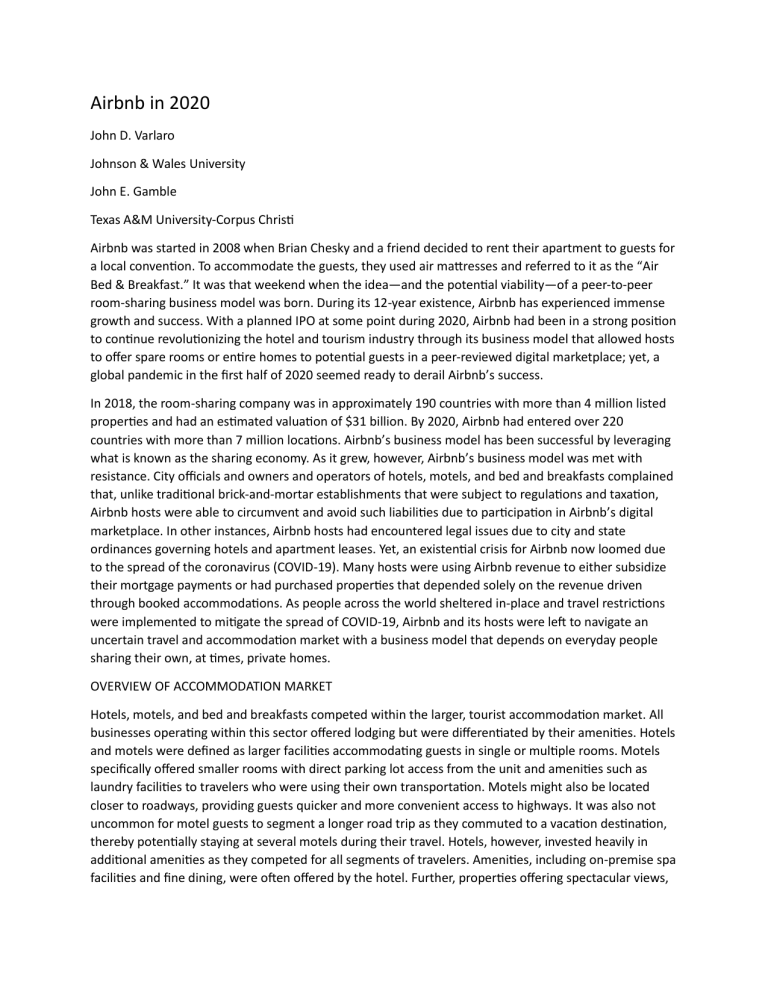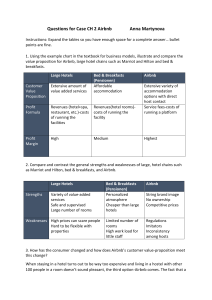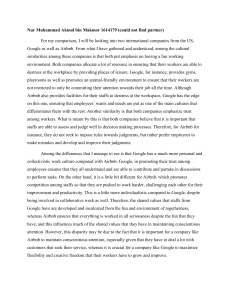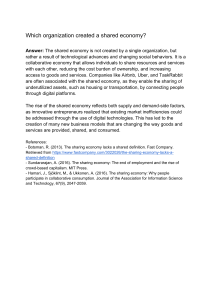
Airbnb in 2020 John D. Varlaro Johnson & Wales University John E. Gamble Texas A&M University-Corpus Christi Airbnb was started in 2008 when Brian Chesky and a friend decided to rent their apartment to guests for a local convention. To accommodate the guests, they used air mattresses and referred to it as the “Air Bed & Breakfast.” It was that weekend when the idea—and the potential viability—of a peer-to-peer room-sharing business model was born. During its 12-year existence, Airbnb has experienced immense growth and success. With a planned IPO at some point during 2020, Airbnb had been in a strong position to continue revolutionizing the hotel and tourism industry through its business model that allowed hosts to offer spare rooms or entire homes to potential guests in a peer-reviewed digital marketplace; yet, a global pandemic in the first half of 2020 seemed ready to derail Airbnb’s success. In 2018, the room-sharing company was in approximately 190 countries with more than 4 million listed properties and had an estimated valuation of $31 billion. By 2020, Airbnb had entered over 220 countries with more than 7 million locations. Airbnb’s business model has been successful by leveraging what is known as the sharing economy. As it grew, however, Airbnb’s business model was met with resistance. City officials and owners and operators of hotels, motels, and bed and breakfasts complained that, unlike traditional brick-and-mortar establishments that were subject to regulations and taxation, Airbnb hosts were able to circumvent and avoid such liabilities due to participation in Airbnb’s digital marketplace. In other instances, Airbnb hosts had encountered legal issues due to city and state ordinances governing hotels and apartment leases. Yet, an existential crisis for Airbnb now loomed due to the spread of the coronavirus (COVID-19). Many hosts were using Airbnb revenue to either subsidize their mortgage payments or had purchased properties that depended solely on the revenue driven through booked accommodations. As people across the world sheltered in-place and travel restrictions were implemented to mitigate the spread of COVID-19, Airbnb and its hosts were left to navigate an uncertain travel and accommodation market with a business model that depends on everyday people sharing their own, at times, private homes. OVERVIEW OF ACCOMMODATION MARKET Hotels, motels, and bed and breakfasts competed within the larger, tourist accommodation market. All businesses operating within this sector offered lodging but were differentiated by their amenities. Hotels and motels were defined as larger facilities accommodating guests in single or multiple rooms. Motels specifically offered smaller rooms with direct parking lot access from the unit and amenities such as laundry facilities to travelers who were using their own transportation. Motels might also be located closer to roadways, providing guests quicker and more convenient access to highways. It was also not uncommon for motel guests to segment a longer road trip as they commuted to a vacation destination, thereby potentially staying at several motels during their travel. Hotels, however, invested heavily in additional amenities as they competed for all segments of travelers. Amenities, including on-premise spa facilities and fine dining, were often offered by the hotel. Further, properties offering spectacular views, bolstering a hotel as the vacation destination, may contribute to significant operating costs. In total, wages, property, and utilities, as well as purchases such as food, accounted for 78 percent of the industry’s total costs—see Exhibit 1. The primary market segments of hotels and motels are presented in Exhibit 2. Bed and breakfasts, however, were much smaller, usually where owner-operators offered a couple of rooms within their own home to accommodate guests. The environment of the bed and breakfast—one of a cozy, home-like ambiance—was what the guest desired when booking a room. Contrasted with the hotel or motel, a bed and breakfast offered a more personalized, quieter atmosphere. Further, many bed and breakfast establishments were in rural areas where the investment to establish a larger hotel may have been cost prohibitive, yet the location itself could be an attraction to tourists. In these areas individuals invested in a home and property, possibly with a historical background, to offer a bed and breakfast with great allure and ambience for the guests’ experiences. Thus, the bed and breakfast competed through offering an ambiance associated with a more rural, slower pace through which travelers connected with their hosts and the surrounding community. While differing in size and target consumer, all hotels, motels, and bed and breakfasts were subject to city, state, and federal regulations. These regulations covered areas such as the physical property and food safety, access for persons with disabilities, and even alcohol distribution. Owners and operators were subject to paying fees for different licenses to operate. Due to operating as a business, these properties and the associated revenues were also subject to state and federal taxation. In addition to regulations, the need to construct physical locations prevented hotels and motels from expanding quickly, especially in new international markets. Larger chains tended to expand by purchasing pre-existing physical locations or through mergers and acquisitions, such as Marriott International Inc.’s acquisition of Starwood Hotels and Resorts Worldwide in 2016. A BUSINESS MODEL FOR THE SHARING, HEALTHY ECONOMY Startup companies have been functioning in a space commonly referred to as the “sharing economy” for several years. According to Chesky, the previous model for the economy was based on ownership.1 Thus, operating a business first necessitated ownership of the assets required to do business. Any spare capacity the business faced—either within production or service—was a direct result of the purchase of hard assets in the daily activity of conducting business. Airbnb and other similar companies, however, operated through offering a technological platform, where individuals with spare capacity could offer their services. By leveraging the ubiquitous usage of smartphones and the continual decrease in technology costs, these companies provided a platform for individuals to instantly share a number of resources. Thus, a homeowner with a spare room could offer it for rent, or the car owner with spare time could offer his or her services a couple of nights a week as a taxi service. The individual simply signed up through the platform and began to offer the service or resource. The company then charged a small transaction fee as the service between both users was facilitated. Within its business model, Airbnb received a percentage of what the host received for the room. For Airbnb, its revenues were decoupled from the considerable operating expenses of traditional lodging establishments and provided it with significantly smaller operating costs than hotels, motels, and bed and breakfasts. Rather than expenses related to owning and operating real estate properties, Airbnb’s expenses were that of a technology company. Airbnb’s business model, therefore, was based on the revenue-cost-margin structure of an online marketplace, rather than a lodging establishment. With an estimated 11 percent fee per room stay, it was reported that Airbnb achieved profitability for a first time in 2016,2 and in 2017 Airbnb announced in an annual investors’ meeting that the company had recorded nearly $3 billion in revenue and earned over $90 million in profit.3 A CHANGE IN THE CONSUMER EXPERIENCE Airbnb, however, had not just been leveraging technology. It had also leveraged the change in how the current consumer interacted with businesses. In conjunction with this change seemed to be how the consumer had deemphasized ownership. Instead of focusing on ownership, consumers seemed to prefer sharing or renting. Other startup companies have been targeting these segments through subscriptionbased services and on-demand help. From luxury watches to clothing, experiencing—and not owning— assets seemed to be on the rise. Citing a more experiential-based economy, Chesky believed Airbnb guests desired a community and a closer relationship with the host—and there seemed to be support for this assertion.4 A recent Goldman Sachs study showed that, once someone used Airbnb, their preference for a traditional accommodation was greatly reduced.5 The appeal of the company’s value proposition with customers had allowed it to readily raise capital to support its growth, including an $850 million cash infusion in 2016 that raised its estimated valuation to $30 billion. A comparison of Airbnb’s 2018 and 2020 estimated market capitalization to the world’s largest hoteliers is presented in Exhibit 3. Recognizing this shift in consumer preference, traditional brick-and-mortar operators responded. Hilton was considering offering a hostel-like option to travelers.6 Other entrepreneurs were constructing urban properties to specifically leverage Airbnb’s platform and offer rooms only to Airbnb users, such as in Japan7 where rent and hotel costs were extremely high. To govern the community of hosts and guests, Airbnb instituted a rating system. Popularized by companies such as Amazon, eBay, and Yelp, peer-to-peer ratings helped police quality. Both guests and hosts rated each other in Airbnb. This approach incentivized hosts to provide quality service, while encouraging guests to leave a property as they found it. Further, the peer-to-peer rating system greatly minimized the otherwise significant task and expense of Airbnb employees assessing and rating each individual participant within Airbnb’s platform. NOT PLAYING BY THE SAME RULES Local and global businesses criticized Airbnb for what they claimed were unfair business practices and lobbied lawmakers to force the company to comply with lodging regulations. These concerns illuminated how, due to its business model, Airbnb and its users seemed not to abide by these same regulations. This could have been concerning on many levels. For the guest, regulations exist for protection from unsafe accommodations. Fire codes and occupation limits all exist to prevent injury and death. Laws also exist to prevent discrimination, as traditional brick-and-mortar accommodations are barred from not providing lodging to guests based on race and other protected classes, but there seemed to be evidence that Airbnb guests had faced such discrimination from hosts.8 Hosts might also expose themselves to legal and financial problems from accommodating guests. There had been stories of hosts needing to evict guests who would not leave, and, due to local ordinances, the guests were actually protected as apartment lessees. Other stories highlighted rooms and homes being damaged by huge parties given by Airbnb guests. Hosts might also be exposed to liability issues in the instance of an injury or even a death of a guest. Finally, there were accusations of businesses using Airbnb’s marketplace to own and operate accommodations without obtaining the proper licenses. These locations appeared to be individuals on the surface but were actually businesses. And, because of Airbnb’s platform, these pseudo-businesses could operate and generate revenue without meeting regulations or claiming revenues for taxation. Airbnb continued to respond to some of these issues. Airbnb released a report in 2015 detailing both discrimination on its platform and how it would be mitigated. Airbnb also settled its lawsuit with San Francisco in early 2017. The city was demanding Airbnb enforce a city regulation requiring host registration or incur significant fines. As part of the settlement, Airbnb agreed to offer more information on its hosts within the city.9 And in 2018, Airbnb began partnering with local municipalities to help collect taxes automatically for rentals within their jurisdictions, helping to potentially recoup millions in lost tax revenue.10, 11 Recognizing that countries and local municipalities were responding to the local business owner and their constituents’ concerns, Chesky and Airbnb had focused on mobilizing and advocating for consumers and business owners who utilize the app. Airbnb’s website provided support for guests and hosts who wished to advocate for the site. A focal point of the advocacy emphasized how those particularly hit hard at the height of the recession in 2009 relied on Airbnb to establish a revenue stream and prevent the inevitable foreclosure and bankruptcy. “We wish to be regulated; this would legitimize us,” Chesky remarked to Trevor Noah in an interview on The Daily Show.12 A BUSINESS MODEL FOR THE COVID ECONOMY In 2019, Airbnb finally announced that the long-awaited IPO would occur during 2020, and Airbnb’s revenues were estimated to reach over $2 billion—see Exhibit 4. However, Airbnb dampened expectations with the announcement that it had experienced a net loss of over $300 million through September 2019 due to increases in operating costs.13 Then, in the spring of 2020, the pandemic and efforts by the subsequent state and local governments to stop the spread of COVID-19 presented a significant threat to Airbnb and its business model. Instead of preparing for the IPO, Airbnb had to raise $2 billion in private equity funding and debt to support operations during the pandemic.14, 15 And in May 2020, Airbnb announced 1900 employees, or about one quarter of the workforce, would be let go.16 Quickly, Airbnb tried to adjust its business operations. As guests cancelled their stays with hosts, Airbnb adjusted its cancellation policy. Normally, hosts had discretion over how to handle cancellations. Due to travel restrictions imposed by state and local governments, guests were forced to cancel their stays. Yet some hosts were still charging these guests based on their own cancellation policies. In response, Airbnb adjusted the policy by offering refunds for reservations made prior to March 14, 2020, through the end of June 2020. Airbnb also offered safety and cleaning guidelines for its hosts. Given the nature of the pandemic, it had become paramount to ensure cleanliness. A guest or a host contracting COVID-19 due to an Airbnb stay could most certainly make people reluctant to use Airbnb in the future. For the hosts, however, the loss of the revenue streams seemed to be the most immediate problem. Many hosts depended on their revenue from rentals to afford the properties they owned, either as private homes or as short-term rental properties. Over the years, many hosts had built their finances around the anticipated revenue from guests. Since the pandemic began, some hosts reported they had experienced monetary losses in the tens of thousands of dollars. To support hosts, Airbnb established a $17 million fund to help support hosts that had acquired long-term status with Airbnb.17 To confront the challenges of the pandemic, Airbnb expanded its sharing-economy model by entering the “Online Experiences” market. Virtual experiences, such as cigar tastings and virtual guided tours of cities were all being offered for patrons to book and experience from their own home–whether or not they were under stay-at-home orders. It was clear that in 2020, if Airbnb was going to successfully navigate the pandemic, it would have to consider what else people may be willing to share, albeit virtually, in a pandemic economy. ENDNOTES 1 Interview with Airbnb founder and CEO Brian Chesky, The Daily Show with Trevor Noah, Comedy Central, February 24, 2016. 2 B. Stone and O. Zaleski, “Airbnb Enters the Land of Profitability,” Bloomberg, January 26, 2017, https://www.bloomberg.com/news/articles/2017-01-26/airbnb-enters-the-land-of-profitability (accessed June 20, 2017). 3 O. Zaleski, “Inside Airbnb’s Battle to Stay Private,” Bloomberg.Com, February 6, 2018, https://www.bloomberg.com/news/articles/2018-02-06/inside-airbnb-s-battle-to-stay-private (accessed April 20, 2018). 4 Interview with Airbnb founder and CEO Brian Chesky, The Daily Show with Trevor Noah, Comedy Central, February 24, 2016. 5 J. Verhage, “Goldman Sachs: More and More People Who Use Airbnb Don’t Want to Go Back to Hotels,” Bloomberg, February 26, 2016, www.bloomberg.com/news/articles/2016-02-16/goldmansachs-more-and-more-people-who-use-airbnb-don-t-want-to-go-back-to-hotels. 6 D. Fahmy, “Millennials Spending Power Has Hilton Weighing a ‘Hostel-Like’ Brand,” March 8, 2016, Bloomberg Businessweek, www.bloomberg.com/businessweek. 7 Y. Nakamura and M. Takahashi, “Airbnb Faces Major Threat in Japan, Its Fastest-Growing Market,” Bloomberg, February 18, 2016, www.bloomberg.com/news/articles/2016-02-18/fastest-growing-airbnbmarket-under-threat-as-japan-cracks-down. 8 R. Greenfield, “Study Finds Racial Discrimination by Airbnb Hosts,” Bloomberg, December 10, 2015, www.bloomberg.com/news/articles/2015-12-10/study-finds-racial-discrimination-by-airbnb-hosts. 9 K. Benner, “Airbnb Adopts Rules to Fight Discrimination by Its Hosts,” New York Times, (September 8, 2016) http://www.nytimes.com/2016/09/09/technology/airbnb-anti-discrimination-rules.html (accessed June 20, 2017). 10 S. Cameron, “New TN Agreement Ensures $13M in Airbnb Rental Taxes Collected,” wjhl.com, April 20, 2018, http://www.wjhl.com/local/new-tn-agreement-ensures-13m-in-airbnb-rental-taxescollected/1131192392 (accessed April 20, 2018). 11 “Duluth, Airbnb Make Deal on Lodging Tax Collection,” TwinCitiesPioneerPress, April 19, 2018, https://www.twincities.com/2018/04/19/duluth-airbnb-make-deal-on-lodging-tax-collection/ (accessed April 20, 2018). 12 Interview with Airbnb founder and CEO Brian Chesky, The Daily Show with Trevor Noah, Comedy Central, February 24, 2016. 13 J. Eaglesham, M. Farrell, & K. Grind. “Airbnb Swings to a Loss as Costs Climb Ahead of IPO,” The Wall Street Journal, https://www.wsj.com/articles/airbnb-swings-to-a-loss-as-costs-climb-ahead-of-ipo11581443123 (accessed May 21, 2020). 14 E. Griffith. “Airbnb Raises $1 Billion to Stockpile Cash in Pandemic,” The New York Times, April 6, 2020, https://www.nytimes.com/2020/04/06/technology/airbnb-coronavirus-valuation.html (accessed May 21, 2020). 15 E. Wollman. “Airbnb Gets $1 Billion Loan, Bringing Coronavirus Funding to $2 Billion,” The Wall Street Journal, April 15, 2020, https://www.wsj.com/articles/airbnb-gets-1-billion-loan-bringing-coronavirusfunding-to-2-billion-11586929819?mod=article_inline (accessed May 21, 2020). 16 D. Bosa, & S. Rodriguez. “Airbnb to lay off nearly 1,900 people, 25% of company,” CNBC, May 5, 2020, https://www.cnbc.com/2020/05/05/airbnb-to-lay-off-nearly-1900-people-25percent-of-company.html (accessed May 21, 2020). 17 T. Mickle, & P. Rana. “A Bargain with the Devil–Bill Comes Due for Overextended Airbnb Hosts,” The Wall Street Journal, April 28, 2020, https://www.wsj.com/articles/a-bargain-with-the-devilbill-comesdue-for-overextended-airbnb-hosts-11588083336 (accessed May 21, 2020).




